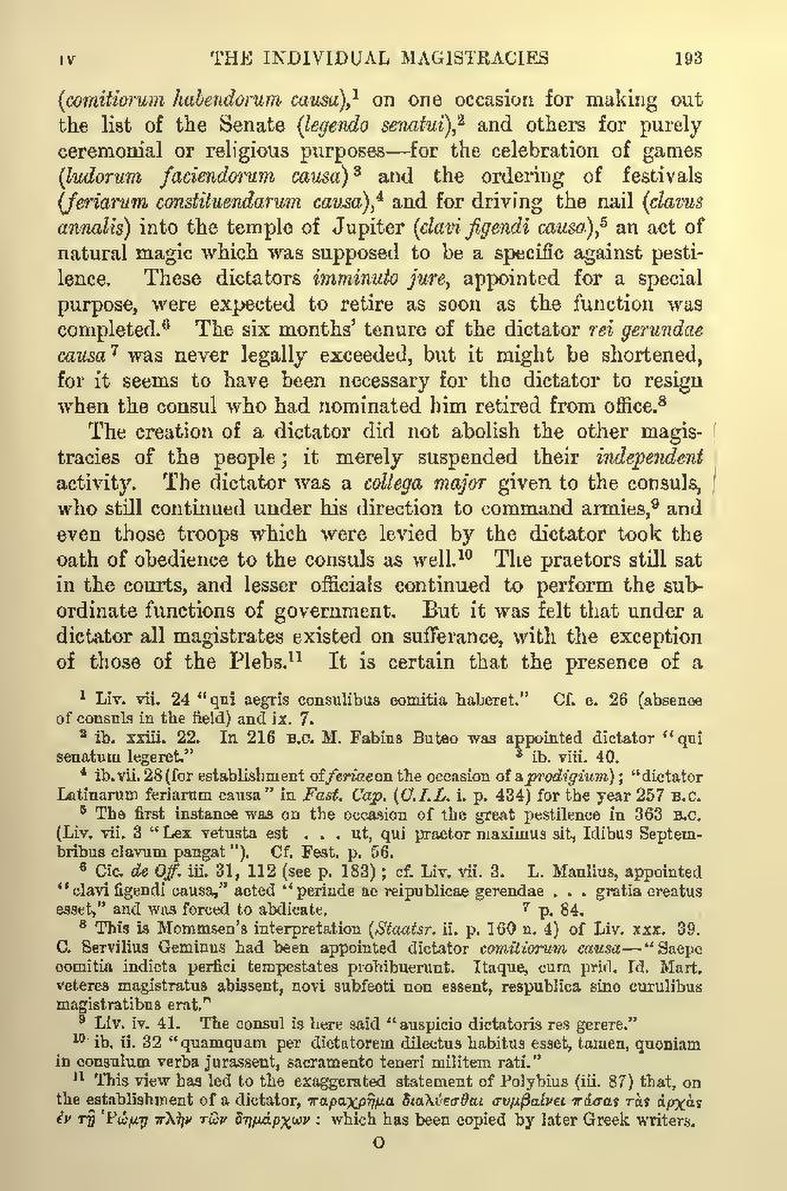(comitiorum habendorum causa),[1] on one occasion for making out the list of the Senate (legendo senatui),[2] and others for purely ceremonial or religious purposes—for the celebration of games (ludorum faciendorum causa)[3] and the ordering of festivals (feriarum constituendarum causa),[4] and for driving the nail (clavus annalis) into the temple of Jupiter (clavi figendi causa),[5] an act of natural magic which was supposed to be a specific against pestilence. These dictators imminuto jure, appointed for a special purpose, were expected to retire as soon as the function was completed.[6] The six months' tenure of the dictator rei gerundae causa[7] was never legally exceeded, but it might be shortened, for it seems to have been necessary for the dictator to resign when the consul who had nominated him retired from office.[8]
The creation of a dictator did not abolish the other magistracies of the people; it merely suspended their independent activity. The dictator was a collega major given to the consuls, who still continued under his direction to command armies,[9] and even those troops which were levied by the dictator took the oath of obedience to the consuls as well.[10] The praetors still sat in the courts, and lesser officials continued to perform the subordinate functions of government. But it was felt that under a dictator all magistrates existed on sufferance, with the exception of those of the Plebs.[11] It is certain that the presence of a: which has been copied by later Greek writers.]
- ↑ Liv. vii. 24 "qui aegris consulibus comitia haberet." Cf. c. 26 (absence of consuls in the field) and ix. 7.
- ↑ ib. xxiii. 22. In 216 B.C. M. Fabius Buteo was appointed dictator "qui senatum legeret."
- ↑ ib. viii. 40.
- ↑ ib. vii. 28 (for establishment of feriae on the occasion of a prodigium); "dictator Latinarum feriarum causa" in Fast. Cap. (C.I.L. i. p. 434) for the year 257 B.C.
- ↑ The first instance was on the occasion of the great pestilence in 363 B.C. (Liv. vii. 3 "Lex vetusta est . . . ut, qui praetor maximus sit, Idibus Septembribus clavum pangat"). Cf. Fest. p. 56.
- ↑ Cic. de Off. iii. 31, 112 (see p. 183); cf. Liv. vii. 3. L. Manlius, appointed "clavi figendi causa," acted "perinde ac reipublicae gerendae . . . gratia creatus esset," and was forced to abdicate.
- ↑ p. 84.
- ↑ This is Mommsen's interpretation (Staatsr. ii. p. 160 n. 4) of Liv. xxx. 39. C. Servilius Geminus had been appointed dictator comitiorum causa—"Saepe comitia indicta perfici tempestates prohibuerunt. Itaque, cum prid. Id. Mart. veteres magistratus abissent, novi subfecti non essent, respublica sine curulibus magistratibus erat."
- ↑ Liv. iv. 41. The consul is here said "auspicio dictatoris res gerere."
